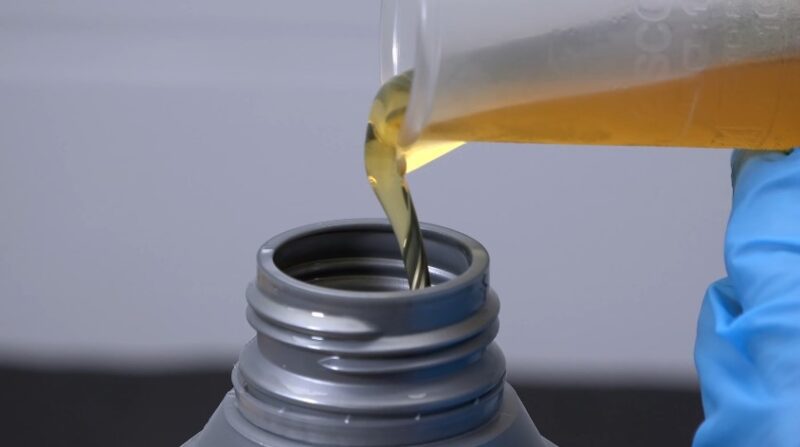
Share Post:
Sometimes it feels like every auto shop is pushing synthetic oil. Drivers talk about better protection, fewer oil changes, and top-notch performance in brutal weather. But that price tag tends to make people pause.
Is it really worth it, or are we falling for marketing hype? Let’s walk through the basics, weigh some pros and cons, and see how synthetic oil holds up compared to the old-school stuff.
Table of Contents
ToggleSide-by-Side Comparison
| Aspect | Synthetic Oil | Conventional Oil |
| Cost | Higher upfront expense | Cheaper upfront |
| Change Interval | Typically 10,000–15,000 miles (or annually) | Around 3,000–5,000 miles |
| Temperature Handling | Excellent in extreme cold and heat | More prone to thickening in cold, thinning in heat |
| Engine Cleanliness | Minimal sludge, fewer deposits | Sludge buildup happens faster |
| Fuel Efficiency | Can improve gas mileage slightly | More friction, so less efficient overall |
| Waste Output | Fewer oil changes mean less waste | Frequent changes lead to more waste |
| Ideal Use | High-performance, turbocharged, or harsh conditions | Standard engines, everyday driving |
Synthetic Oil In a Nutshell
Synthetic oil is created in a lab from chemical compounds, unlike conventional oil that’s directly refined from crude. The unique production process results in molecules with a consistent shape and size, which helps engines run smoothly under punishing conditions.
Why Uniform Molecules Matter
A lot of drivers wonder why it’s superior in certain conditions. Think of it like comparing polished ball bearings with random pebbles: polished bearings roll nice and steady, while pebbles might cause friction or clogs.
Synthetic oil’s uniform molecular structure reduces friction, which translates to better engine protection and improved efficiency.
Benefits of Going Synthetic

Several strong points make synthetic oil worth a look. I put it through rigorous tests in different scenarios, and saw its performance in different situations.
Longer Change Intervals
- Extended mileage: Many synthetic blends can roll up to 10,000 or even 15,000 miles before needing a swap. Conventional oil often needs a refresh closer to 3,000–5,000 miles.
- Time saver: Fewer oil changes mean less time scheduling service appointments. Perfect if you’d rather be on the road than in the garage.
- Cost balance: The initial price is higher, but fewer changes might balance out expenses over the course of a year or two.
Strong Performance in Extreme Temperatures
- Cold starts: Synthetic oil flows more efficiently in freezing conditions, like coolant, so the engine gets lubrication immediately. That helps prevent metal-on-metal rubbing when you first fire up the car in winter.
- Heat tolerance: The molecular structure holds up better under scorching conditions, which can be a game-changer if you live in a hot climate or do a lot of towing.
Cleaner Engine Internals
- Less sludge buildup: Fewer impurities mean there’s a lower risk of grimy deposits. Engines that stay cleaner are less likely to develop nasty sludge over time.
- Extended engine life: A cleaner environment inside the engine often translates to reduced wear on critical parts.
Possible Fuel Economy Boost
- Reduced friction: By lowering friction, synthetic oil can sometimes help with fuel efficiency. It might not be a jaw-dropping boost, but every bit can help.
- Smoother ride: Some people also report a slight uptick in horsepower or at least a more responsive feel when accelerating.
Environmental Perks
- Less waste oil: Changing oil less often means fewer used oil disposals, which benefits the environment.
- Eco-friendly certifications: Several producers are moving toward greener formulations, offering a nod to sustainability.
Drawbacks and Concerns

Nothing’s perfect, and synthetic oil has a few downsides worth pointing out.
Bigger Upfront Cost
- Sticker shock: On average, it can cost 30% more (sometimes even double) compared to conventional oil. That can be a real hurdle for people on a tight budget.
- Payoff timeline: While less frequent changes may save money in the long run, the higher upfront price can feel tough when finances are tight.
Older Engine Leak Risks
- Possible seal incompatibility: Some older engines might not be thrilled about a switch to synthetic, because the smaller, uniform molecules can slip through worn or outdated seals.
- Modern formulas: Most synthetic oils now include additives that help with compatibility, so the problem isn’t as common as it used to be. Checking with a trusted mechanic is still wise if you’re rolling around in a classic ride.
Might Be Overkill for Mild Driving
- Routine commutes: If your vehicle sees only short trips in normal weather, the benefits might not outweigh the higher price.
- Manual guidance: A manufacturer’s recommendations often indicate the oil they tested for that specific engine design. If the manual says conventional oil is fine, you can feel less pressured to upgrade.
Is It Worth Making the Switch?
A lot depends on what you drive, how you drive, and how much you want to invest. Performance-oriented engines—turbochargers, sports cars, heavy-duty trucks—usually benefit the most.
If you’re pushing your vehicle hard or live somewhere with temperature swings that make engines scream, synthetic often pays for itself in fewer repairs and longer intervals between changes.
On the other hand, if you mostly cruise around town in mild weather, conventional oil might keep your engine humming just fine at a lower cost.
Some people like the idea of longer intervals no matter what, and others aren’t bothered by more frequent changes. It’s really about personal preference and needs.
Points to Ponder
- Check the owner’s manual: Some manufacturers specifically call for synthetic from day one (especially for turbo engines). Others give you a choice, making the final call more flexible.
- Consider vehicle age: Older rides might need a bit more caution. A quick conversation with a trusted mechanic can clear up any potential seal issues.
- Think about resale value: A well-maintained engine can fetch a better price if you ever decide to sell, though it’s not always a direct correlation.
Budget Realities
Money is often the make-or-break factor. A jug of synthetic could easily be double the cost of standard oil on the store shelf. For those who prefer rolling into a quick-lube place and paying the least possible, conventional is tempting.
But if you can swing the extra cost, the payoff in fewer oil changes and possible fuel savings can close the gap. Over the life of a car, well, many people say it’s worth it.
Consider the engine’s potential repair costs too. Replacing worn-out parts caused by poor lubrication can cost far more than a few extra bucks per oil change.
Practical Tips

I’ve worked on plenty of engines over the years, and there’s a noticeable difference in how synthetic-treated engines look on the inside—cleaner surfaces, fewer varnish layers, and less gunk around the valves.
If a client has a new or high-performance vehicle, I’ll often suggest at least a synthetic blend. Pure synthetic can be a bit pricey, but even the blended options give you a nice middle ground.
Here are a few pointers for drivers unsure of the next step:
- Watch your oil level: Regardless of which product you choose, keep an eye on oil levels. Low oil can wreck an engine faster than anything else.
- Stay within recommended intervals: Going too long without a change, even with synthetic, can cause sludge if you skip intervals by a huge margin.
- Look for deals: Auto parts stores often run sales or bundle promotions, so you might snag synthetic for cheaper than usual.
Wrapping It Up
In the end, synthetic oil is popular for solid reasons. It can stretch out your oil change schedule, handle brutal temperatures, and possibly give your engine a longer lifespan.
Drivers running performance cars or dealing with heavy loads often find it invaluable. If you’re on a limited budget or stick to modest driving habits, regular oil might still get the job done fine.
The key is matching the product to your vehicle’s demands and your financial comfort zone. No matter the choice, fresh oil and a good filter are essential for engine health.
Give your ride the care it deserves, and it’ll usually return the favor in reliability and fewer costly repairs. Nothing beats the feeling of a well-lubricated engine humming smoothly along the open road.
Safe travels, and may your oil changes be few and far between—on your own terms.
Related Posts:
- Should You Really Buy a Car Online? Pros & Cons Explained
- The Pros and Cons of 32 Amp vs. 40/50 Amp EV Chargers
- Buying a Car with a Rebuilt Title in 2025 - Pros,…
- Hatchback vs. Sedan - Pros, Cons, and Which One to…
- Tesla Model Y vs. Hyundai Ioniq 5 – Real-World…
- Is the 2025 Ford Expedition Worth Its Price? An…









